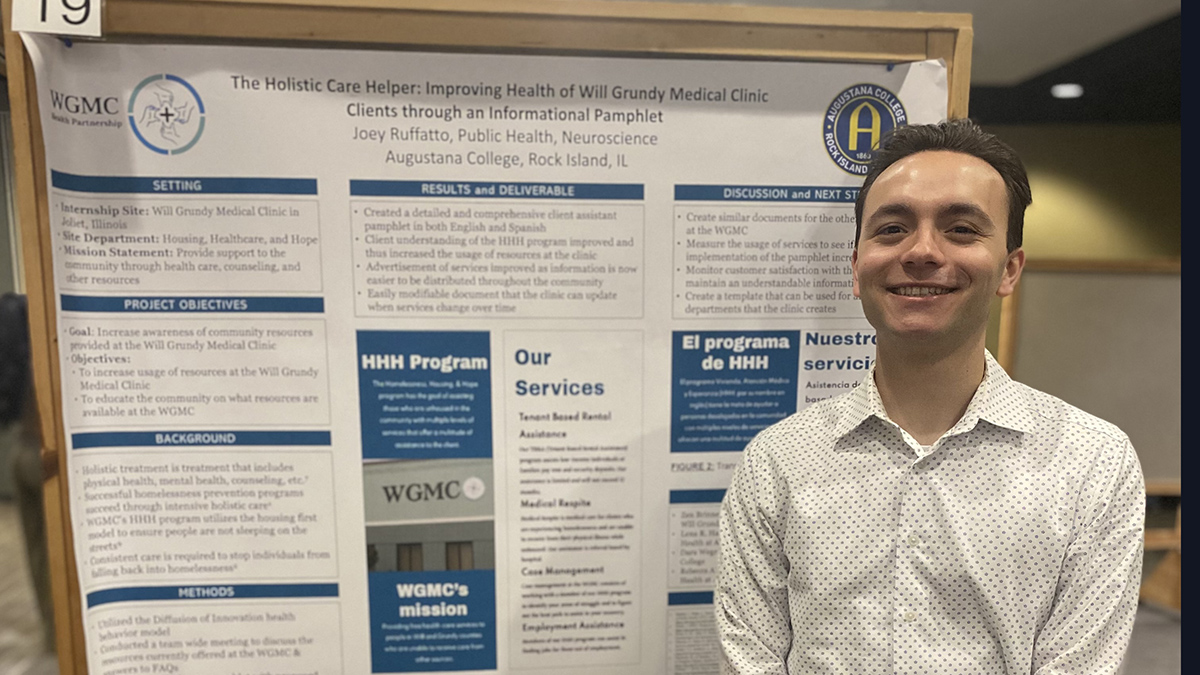Want to help your community become healthier? Add a public health major!
What is public health, and why should I major in it?
Do you want a rewarding career that introduces you to new people, allows you to creatively solve problems and has the opportunity to travel while making the world a healthier place? Public health is one of those “under the radar” professions that seems like a well-kept secret.
Many people don’t know what public health is, or think it just focuses on fixing physical health problems that impact the public at large. While physical activity and health falls under the public health umbrella, that’s only one part of it.
To fully understand the scope of public health, consider the “3 P’s”: Prevent, Promote, Protect.
Public health experts prevent disease, illness and injuries before they occur using science, technology, public policy and community outreach. Just as vaccines can prevent diseases, seat belts can prevent injuries in a car accident, and proper handwashing techniques can prevent the spread of germs. Many public health prevention techniques are invisible because we’ve already incorporated them into our daily lives: think about how often you notice stoplights, fire extinguishers, life vests and smoke-free workplace policies. These are all public health initiatives!
Health promotion professionals work to encourage healthy behaviors that improve overall health and wellbeing, and prolong the enjoyable, active years of life. Health education classes in schools, CPR training in the community, mental health workshops and access to healthy foods are ways that health promotion amplifies public health.
Public health protection safeguards the health of individuals and communities from threats like infectious diseases and environmental hazards. Professionals work in collaboration with communities, government agencies, schools and policymakers to establish protective initiatives. Think: Emergency planning for tornadoes and floods, food safety regulations and new infectious diseases tracking.
Because public health focuses on communities and society, public health experts work in partnership with community organizations, health care facilities and governments at all levels — from local to national to worldwide. Public health professionals often specialize in subfields to hone their skills, like community health, global health, health policy, health education and public health (preventative) medicine.
In these ways, public health is as much like an art as a science. Communication skills, ethics and cultural understanding are sometimes more important than scientific knowledge in helping a community develop new behaviors that promote good health.
Public health is essential to all of us, but it usually happens behind the scenes. Major global events such as the COVID-19 pandemic can bring it to the forefront. That’s when large populations see how public health professionals work together to solve the problems of our present daily lives, and to prevent them from happening in the future.
It’s a fast-growing field, and a fascinating time to study public health. A major in public health can bring you a lifetime of interesting opportunities, challenges and successes.
What kind of school is best for a public health major?
No matter what major you're pursuing, it’s a good idea to research a variety of schools — from large regional universities to smaller colleges. The more you research and visit, the greater the chance you’ll find what matters the most to you and your future.
With a field like public health — or any of the health sciences — some might think a large university and its research facilities are the way to go. But many smaller-sized colleges can offer undergraduates even more access to labs and facilities, more hands-on learning opportunities, more professional connections and also more individual attention from professors and advisors.
Take, for example, Augie public health major Caleb Drew ‘22, who completed a Rural Health Preceptorship and conducted hands-on research with professors that he later co-authored for a professional journal. He graduated with honors and is pursuing graduate school to become a physician’s assistant.
Because students of public health need a broad background of knowledge and experiences, a liberal arts college can be a perfect fit.
As a highly ranked college of the liberal arts and sciences with a trailblazing public health major, Augustana could be a great addition to your college search list. Augie’s 100-level Introduction to Public Health will set you on your path in your first year and lead you to dozens of other courses that fit your interests and goals.
The public health program at Augustana
Augustana has offered a major and minor in public health since 2014, and we’re one of the first liberal arts colleges to offer this major. The college has a long history of excellence in the health sciences, and our graduates have been pursuing careers in public health for many years.
Augustana graduates have had a 100% acceptance rate to master’s programs in public health (MPH) since 1997, and many of our majors go on to pursue graduate degrees in related fields, like medicine, nursing, physical therapy, social work, and health law and policy.
Why are Augustana’s public health majors so successful? It’s a combination of several factors.
At Augustana, your education will combine intensive focus in your field with a broad background of learning across other fields (so important for an interdisciplinary field like public health).
The public health program’s home is in the new Peter J. Lindberg, M.D., Center for Health and Human Performance. And you will have many opportunities for hands-on and professional preparation through internships, professional conferences and service learning experiences off campus and abroad.
Augustana also offers excellent teaching and advising, from your first day on campus until graduation. Declare your public health major and you will have a favorite professor as your major advisor — plus additional advisors for any other majors or minors you might have. Our public health program is home to an award-winning Fulbright Scholar who specializes in helping students find meaningful internships, study abroad opportunities and grant-funded fellowships.
Because of the level of advising, Augustana students find it easier to double-major and add minors. Common fields to combine with public health include anthropology; biology; biochemistry; business; communication studies; data analytics; disability studies; economics; education; ethics; food studies; journalism; kinesiology; neuroscience; nonprofit leadership; political science; pre-law; pre-medicine; pre-nursing; pre-veterinary; psychology; sociology; Spanish and other languages; and women, gender and sexuality studies.
Public health is an interdisciplinary field, and a public health major combines well with other areas of study to ensure well-rounded knowledge that prepares you to make an immediate impact.
What can I do for my public health major, besides go to class?
The story of human health and wellness is long, and always changing. To get the most from your public health major, look for opportunities that take you out of the classroom and into places that give you real exposure to public health at work.
Pursue internships and other hands-on learning experiences — in communities large and small, in your college town or home neighborhood, elsewhere in the United States, or around the world. Experiences like these will boost your learning, your degree and your résumé. The public health major at Augustana even has a special course — PUBH-365: Professionalism in Public Health Practice — to help students explore their interests and find internships.
At Augustana, students go to CORE (Careers, Opportunities, Research, Exploration) for career coaching, help with graduate school applications and résumés, internships, study abroad and more. Every student also has access to $2,000 Augie Choice funding to support a standout learning experience such as research, an internship or study abroad.
Augustana public health majors gain experience through internships like the Texas Medical Center and MD Anderson Cancer Center, service learning trips, study abroad and professional conferences, including the Great Plains Emerging Infectious Diseases Conference and the American Public Health Association Annual Meeting in cities like Chicago, Atlanta, Seattle and Washington, D.C.
Internships take majors as far as Stockholm, Sweden and Haatso, Ghana, or as near as our own Illinois-Iowa Quad Cities — offering the excellent and diverse resources of four (actually five!) partnering cities in two states.
Public health and political science major Caroline Wator ’20 used her Augie Choice $2,000 for a trip to Brazil as a sophomore; like many students she received additional funding from the college to support a hands-on, career-building experience. A student leader grant from CORE paid for expenses during an unpaid but important summer internship with the Chicago Department of Public Health.
During that internship, Wator analyzed factors that impact policy on maternal and infant health to help create better parental leave for the city of Chicago, which later could be extended to the whole state of Illinois. She returned to the Quad Cities for her senior year, where she interned at the Scott County Public Health Department in Davenport.
These experiences helped her pursue her Master in Public Health (MPH) in Health Policy and Administration at University of Illinois Chicago, and she now works as a program manager for the American Academy of Pediatrics.
So, what can I do with my public health degree when I graduate?
A major in public health can go in many directions, bringing you a variety of career path possibilities. A partial list includes:
Attorney
Bioethicist
Biostatistician
Community health specialist
Data analyst
Disease prevention specialist
Education and outreach professional
Emergency response coordinator
Engineer
Environmental and occupational health director
Epidemiologist
Exercise physiologist
Food scientist
Global health manager
Grant specialist
Health communications specialist
Healthcare administrator
Health policy consultant
Medical writer
Nutritionist/dietician
Physician/nurse
Professor/researcher
Public health policy analyst/consultant
Vaccine researcher
Veterinarian
Water management specialist
Graduates also go on to service programs like the Peace Corps, AmeriCorps, the Lutheran Service Corps, Doctors Without Borders and even the Public Health Associates Program with the Centers for Disease Control (CDC).
Health care occupations and industries are expected to add the most new jobs in the United States in the near future, and public health is certainly no exception. More and more, the general approach to health care, wellness and health education means recognizing that we need a deeper and more caring culture of prevention, and not just treatment.
Now what?
Whether you're attracted to public health because you’re interested in law or public policy, medicine, health promotion, the environment or helping communities, your prospects are good and your options are many. But first, you need to choose the right college!
If you’d like to learn more about public health at Augustana, or any of our other ~90 majors, minors and related programs of study, you can start here. To see public health education in action, book your campus visit, sit in on a class, have lunch with current students and meet with a professor.

